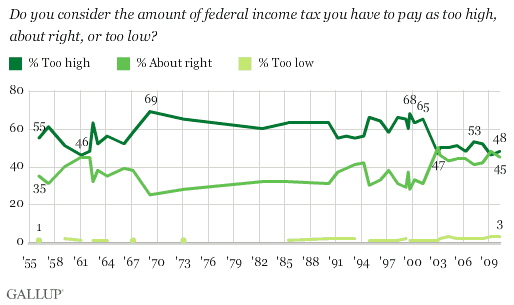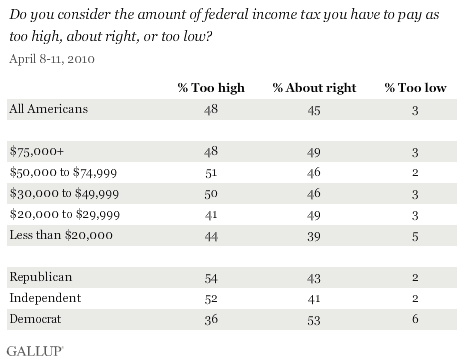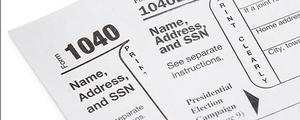PRINCETON, NJ -- For the second straight year, slightly less than half of Americans say the amount of federal income tax they have to pay is too high, while almost as many say the amount they pay in taxes is about right.

Gallup has been asking Americans about taxes in this format since 1956. For most of this time, the majority of Americans have viewed their taxes as too high. This includes the 69% who felt this way in 1969, marking the highest "too high" percentage on record. As recently as 1999, 68% of Americans told Gallup their taxes were too high.
A big shift in these views came about in the last eight years, coincident with the implementation of the George W. Bush administration tax cuts. The "too high" percentage in Gallup's polling fell from 65% in April 2001 to 47% in January 2003 -- after the first Bush tax cuts became law.
Americans' views on taxes have fluctuated modestly since then, rising slightly to 53% "too high" in 2007, before dropping to 46% last year and 48% this year. Last year's percentage tied a reading from 1961 -- shortly after John F. Kennedy had been inaugurated as president -- for the lowest in Gallup history.
Throughout Gallup's history of asking this question, no more than 3% of Americans have ever said they pay "too little" in taxes.
There is not a great deal of differentiation in response to the tax question across major income groups.

Forty-eight percent of Americans in the $75,000 and higher income group say their taxes are too high, exactly the same as the overall average. This is only marginally different from those in lower income categories. (Sample-size considerations dictate that the top income group Gallup uses for its basic surveys is $75,000 and up. It is possible that the small numbers of Americans in higher income groups, in particular those making $250,000 and up, would be more likely to complain that their taxes are too high.)
Republicans, who have generally been identified as favoring deeper tax cuts, are in fact most likely in the current survey to say their taxes are too high, albeit at a level (54%) that is only marginally above the overall average. Democrats are significantly less likely to say their taxes are too high, although 6% say the amount they pay in taxes is too low.
Survey Methods
Results are based on telephone interviews with a random sample of 1,020 national adults, aged 18 and older, conducted April 8-11, 2010. For results based on the total sample of national adults, one can say with 95% confidence that the maximum margin of sampling error is ±4 percentage points.
Interviews are conducted with respondents on land-line telephones (for respondents with a land-line telephone) and cellular phones (for respondents who are cell-phone only).
In addition to sampling error, question wording and practical difficulties in conducting surveys can introduce error or bias into the findings of public opinion polls.
